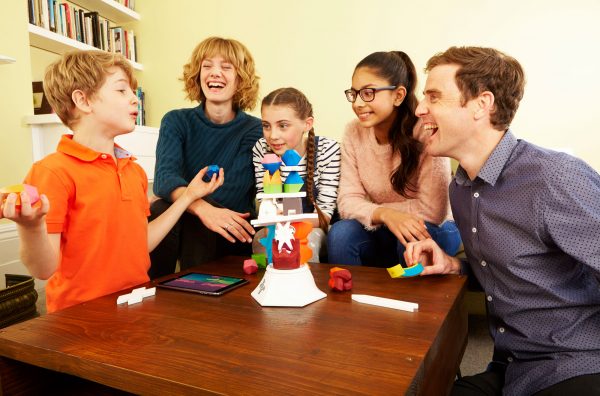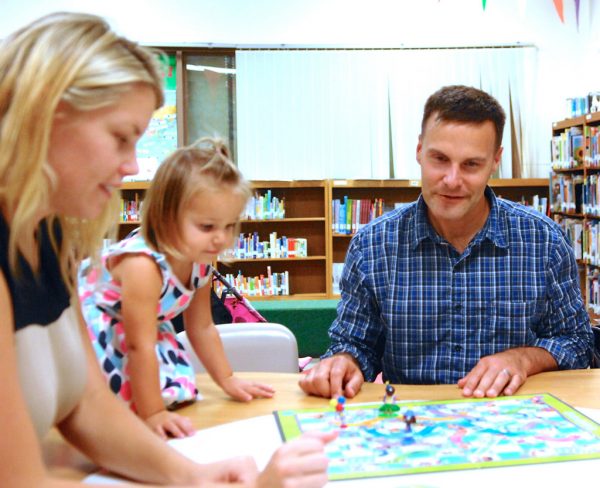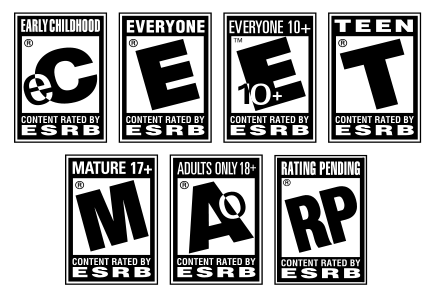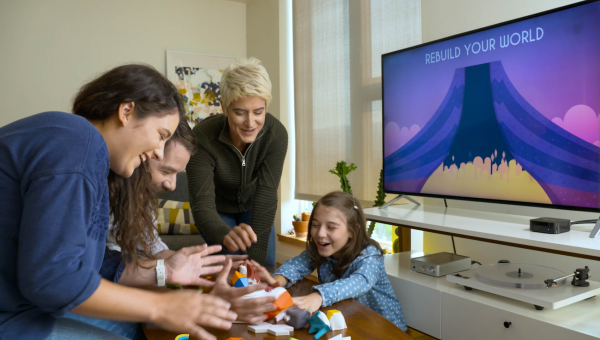Sign-up to our mailing list
Seven Ways Parents Can Encourage Healthy Gaming Habits

Games and play are a powerful force in children’s lives – and an increasingly rich media form that envelops children in interactive stories and vibrant technological creations. With the right guidance, interactive media and structured play can be valuable tools for teaching critical thinking, problem solving, and how to manage emotions under pressure. Games are a bonding experience – playing together can help families to stay close to one another, and playing with friends or simply playing the same games as their friends can be an important part of how children bond with each other, and how they build social currency at school.
Yet many parents have concerns about the role of games in their children’s lives – too much screen time is known to be a problem, and the content of some of the most popular videogames can be wildly inappropriate for children.
Games critic and journalist Zoyander Street spoke to gaming-literate parents – including some on the Sensible Object team – about how they teach their children to play well.
Article Contents
- 1. Play games together as a family
- 2. Do your research
- 3. Keep your children’s games age appropriate
- 4. Understand the content of the games your children play
- 5. Encourage critical thinking through gameplay
- 6. Teach children emotional skills around their gaming habits
- 7. Keep an open door during game time
- Where to start
1. Play games together as a family

One way to ensure that gaming experiences can be shared as a family is by playing together. Cooperative games are important for Lindsey Joyce, a senior lecturer at University of Texas at Dallas focusing on digital and interactive media, who has two children aged 12 and 14. “It forces them to cooperate with each other, which as siblings, isn’t something they always do smoothly.” She sees them developing emotional intelligence by learning to ask questions such as, “When have my boundaries been crossed? How do we find common ground?”
Emotional care becomes especially important when the feelings of other family members might be impacted by a child’s responses to a high-pressure moment in the game. When it comes to games that they play together as a family, Lindsey’s family, “looks for fun, not anything super strategic or intense. We’ll do more strategic things with tabletop but not with videogaming. Three out of four family members are very competitive, and we don’t want there to be hurt feelings when we’re trying to come together as a family.”
“Videogames can be a great bonding experience”, says Sensible Object CMO Alex Bertie. “I play videogames with my son – also my daughter, but more with my son because he’s more interested. I’ve gone from beating him to being beaten every time, so it’s a leveller.”
Tabletop games can be a great tool for families, allowing children and adults to play together in a highly social setting where they are encouraged to make sense of each other’s emotional responses. Alex feels that board games are a particularly good medium for family collaboration. “As a family we regularly play board games together. It’s a really good way to connect across different generations. It’s a very universal activity; the right board games can provide a level playing field that allows kids to compete with adults in a way that they can’t always do in conversation.”
Lindsey has used shared game time as a teaching moment, to encourage her children to learn cooperation when they’re playing Amazing Frog or Minecraft together:, “I tell them to establish rules of engagement before each play session. What are you allowed to do to one another? What are you trying to accomplish? The goal is to limit how quickly it might devolve into conflict. These rules have to be redefined every time they play. Maybe today this one doesn’t want that one blowing up this tower they’ve built, but tomorrow they’ll be finished with it and they grant the other one the gift of being able to destroy it.”
2. Do your research
Not all games can be played together, however. Solo play can be an important way to unwind or to focus on developing a particular skill – and with more narrative-focused videogames, it also opens up opportunities to dive deeper into a story. So how can this be encouraged, without putting children at risk of encountering inappropriate content?
“Part of it is about staying present. Knowing what they are playing, and not letting them play on their own,” says Lindsey. When it comes to choosing games, “We have a conversation at the start, where I do my research and I make them do research too. They are invested in convincing me, they have to do the critical work of winning me over. Show me that you are mature enough to deal with this content. We have a back and forth, and my son might say ‘I feel equipped to deal with this’ and I might say ‘but later on, this other thing happens’.”
Lindsey vets all of her children’s games – and as a games expert, she is better equipped to do so than many other parents: “Being in the industry, I have a lens for thinking about this.” I ask Lindsey if she finds herself having to educate other parents often, and she laughs.
“I hear from other parents once in awhile. ‘So, tell me about Witcher 3?’ But they always ask me after the fact, never beforehand.” Lindsey’s children aren’t allowed to play Witcher 3, but tell her that many of their friends can. “But do your friends have parents who really understand what’s going on?” she counters.
“It’s a double-edged sword. My kids get street cred because their Mom makes videogames, but because of their Mom’s job they don’t get to play the same games as their friends.”
Research is not just a safety issue – for some parents, it’s also a matter of taste. Sensible Object’s COO Nick Button-Brown finds that when his children play mobile games based on their friends’ recommendations, the quality disappoints him. “I do despair sometimes at the games that they pick up from their friends. I want them to play good games the same way that I want them to watch good films. I try to encourage them to play games that I feel are more worthy, particularly games by my friends, games where I see the artistry in what they’re doing. I hope they start to recognise the artistry.”
Nick applies his knowledge of the games industry to make sure his children access games that will extend their skills and expand their perspective. “I will download games that I want them to play, like Reigns, which I think are very interesting. They played Monument Valley because the problem solving within it is interesting. I like Agario because of the strategy that goes into it. Mobile versions of tabletop games as well, that have strategy to them.”
Counsellor Karen Pollock uses online sources to understand the games her children are playing. “Other gamers, or blogs and reviews. Mainly blogs: they are better, because you can see if multiple people are saying the same thing. Feminist bloggers talk about things like misogyny that I’m really concerned about, whereas reviews can be very technically-focused. I don’t care how the game looks, I want to know about the content – that tends to be more what blogs talk about.”
3. Keep your children’s games age appropriate

“I’ve been involved in games since my kids were small, and I have a positive view of them, they can be an amazing medium for teaching problem solving and exploring difficult or multi-faceted issues” says Alex. He sees the risk with games, as with other media, as “exposing children to the wrong kinds of content when they don’t have the capacity to understand what they’re seeing or doing.”
How do you monitor the content of the games your kids are about to play? The age ratings on the back of the box can be a great place to start, but don’t let the conversation end there. Lindsey says the US’s ESRB ratings are “inadequate” when it comes to making nuanced decisions about what is best for one’s own child. “Some things might be rated M, but the reasons for that rating are things that my children are ready to handle. Meanwhile, there are other things that I’m worried about them playing even when they reach the age of 18!”
For Lindsey, the content concerns with games come down to two issues – both of which are covered by ESRB ratings, but not with the particular nuance that she finds important. “Generally my concerns are split down the middle into two issues: How violent is the game? I don’t just mean physical violence, but emotional and psychological violence. And sexual content. At the age they’re at now, I’m not bothered about healthy, consensual sex. I’m looking at the messaging they’re getting from culture about sex, and videogames are unfortunately not typically very good at portraying healthy, consensual relationships.”
There is another side to the coin when it comes to age issues: older children have a different social relationship with games. Alex has noticed this with his own children: the way they consume media has changed as they get older. “There are elements of social currency around videogames that seem to start when kids of both genders are about six or seven, and that’s increased and deepened with our boy as he’s got older. With girls it’s still there, but it’s less intense because they have other pressures.”
Lindsey echoes Alex’s observations about gender being an issue in game moderation. For her, it’s about the way the world conditions young men through all media. “Raising two privileged white males comes with its own concerns. It’s about making sure they are challenged on the messages that they receive about what they are entitled to. Not letting them consume media that will reinforce that, or saying ‘you can play this, but I want us to talk about it afterward’.”
“The increased realism of videogames has increased the pressure on us to regulate and take videogames seriously,” says Alex. “Certain acts and the emotional feedback that you get from characters on screen in HD console games are potentially more impactful than they were in the era of Playstation 2, when it was easy to distinguish between what’s real and what isn’t. [High visual fidelity] has raised the stakes when it comes to differentiating between reality and fantasy.”
4. Understand the content of the games your children play
As someone who enjoys videogames herself, Karen, who lives in England, treats Europe’s PEGI ratings as an imperfect measure that nevertheless provides a good starting point. She uses Grand Theft Auto as a case in point: “We’ve had the GTA argument – it’s not allowed in the house. I get the final say, I check it out.” However, not all M or 18+ rated games are like GTA – some have received a high age rating only because of one specific mature theme, rather than an overall abundance of mature content. For Karen, her own understanding of the content is crucial. “Most of the time, I ignore the ratings. They both play Fallout 4, for example. A made-up dystopia where the major concern is drug use? Well yes, we talk about drug use, I trust them with that content.”
Grand Theft Auto was a struggle for most of the parents I spoke to. Lindsey has regular discussions about it with her children: “My 12-year-old has for years wanted to play GTA5, and it’s pretty much on my no-go list. Even with my 14 year old, I’m like ‘I just don’t know about this’. The last time we had this conversation, my 12-year-old argued, ‘all of this stuff you’re worried about is opt-in [players choose to behave a certain way] : I’m offended that you would assume I’d do that. But if you trust me so little, there’s a mod that makes it child-friendly.’ I said, if you know how to install the mod, you know how to uninstall it. So it was still a no.”
Although it’s hard to be the bad guy, Lindsey knows that these discussions are an important part of their children’s intellectual development. “Each time they bring it to me, it’s a different level of discourse. When he convinces me, I’ll know he’s mature enough to handle it.”
Nick similarly has had to take a hard line on GTA in his home. “I’m very careful about games, I’ll read reviews and find out about the content. It’s difficult, because kids will download games that their friends are playing and they’re not necessarily games that have merit, they’re just games that have a [famous brand] license attached. It’s an area that bothers me, I wish we had a way to get more people to play the games that have intrinsic value.”
For Nick, this is a point of professional pride as well as parental concern. “People who don’t know games think that all games are violent, but the number of violent games is tiny. People only see the military first person shooters and think all games are like that. I would like to find a better way of educating people about that; I do it to my friends and they do it to their friends.”
Understanding what kind of content games feature is vital. Age ratings may not reflect how mature topics are handled by a game: you might decide that Mafia 3 is a valuable game for your teenager to play because of its treatment of racism in 1970s America, or that they are mature enough to handle the violence in the Assassin’s Creed games while still learning something valuable from their historical settings.
5. Encourage critical thinking through gameplay

All of the parents I spoke to agreed that there was something valuable that their children got out of gaming. A common joy for parents was seeing their children develop problem-solving, critical thinking, and moral reasoning skills.
Alex sees a lot of benefits resulting from the unique ways that games tell stories: “I’ve noticed well-constructed games with depth that have branching narratives or open world structures where you invest in a character and make choices, often moral choices, and make complex decisions about how to approach a particular problem or quest. There are a bunch of developmental benefits that are often overlooked by commentators in the media.”
Lindsey has a slightly different take on this, highlighting the fact that many games deal with failure gently, especially games that are suitable for younger children. “Games prompt critical thinking skills in a safe environment, where failure is expected and followed by a teaching moment.” She sees particular benefit in games whereby “animations are comedic for failure, and it doesn’t make you feel bad.” Mario games are much easier on children’s emotional skills than, say, Dark Souls, with its dramatic “you died” screen and risk of losing items. “At age 14 my child is only just able to deal with that content”.
Nick Button-Brown says that while all screen time is worth monitoring, games are a more mentally stimulating medium than others, and aren’t as passive. “I’m very aware of the amount of time they spend on screens just as with spending time on anything. I actually think gaming is healthier than TV because it stretches them. I’m happier with them doing that than vegetating. It has to ask them to think.”
“I’ve been doing some work for adults on teaching critical thinking and moral reasoning through games,” explains Nick. “You ask people to weigh up evidence and make decisions based on what you see. A lot of games will ask you to question the morals of what is happening. You have to think about the decisions you’re making and their outcomes on other people.”
6. Teach children emotional skills around their gaming habits
Nick is also sensitive to how games can negatively affect his children’s mental states. “If you do too much of anything, it affects kids because they get too distracted. … it is an amount of time thing. If they’re coming home and just playing a game or watching TV for hours, that concerns me. Both will choose to play a game above anything else. If I gave them a lot of free time they’d spend all of that time playing games.”
He has a few different strategies for moderating gaming time. “I’ll tell them to stop and we’ll get a board game out, or we’ll switch to a game that we all play together.” He has even used what he calls “cheap gimmicks”, such as allowing them to earn gameplay time by spending time on an exercise bicycle. “My son is recovering from a broken arm, and because of that his level of fitness has gone down, so he has a bike in the lounge. We’ve done that for my daughter as well because she saw it as a great way to get game time. There is a maximum amount of time that they’re allowed to earn,” he adds, noting that before that upper limit was set, it was easy for his children to end up overdoing it on the bicycle in order to maximise game time.
While the idea of earning gaming privileges through an exercise machine might bring up Black Mirror images of a disempowering dystopian future, at their core, gimmicks like this are about building habits that will allow children to have more agency in adulthood. “It’s the same with anything, you don’t get dessert until you’ve eaten your vegetables. You try to make it instinctive, so that in five years time they do it naturally. If you can teach them to do gaming in moderation that sets them up for the rest of their life. They see the changes that happen if they spend too much time doing something.”
Karen has similar concerns over how much time her children could spend on videogames without her intervention. “You have to put time limits in place, or else they would play for 8 hours.” But Karen recognises another issue with games: they have a strong impact on the emotions, and this can be distressing to children who lack the emotional maturity to process what is happening. “They can get very absorbed, upset, or angry if something goes wrong. They really want to do well at it and they can lose it if that doesn’t happen.”
Karen was the only parent I interviewed who didn’t have a long list of physical and mental benefits that she sees her children getting out of games. “I wouldn’t say that gaming is an advantage or a disadvantage, it’s just a fact. It’s their hobby, and because it’s their hobby I want to be involved in it. It’s an interest, and a way they connect with other people who share their hobby and their interest.” Understanding her children’s interests is naturally appealing to Karen, beyond her own personal interest in gaming.
Like most parents, Alex sees a number of risks around “unregulated play”. Although many games are designed responsibly, with respect for players’ autonomy, “a lot of games are designed to be addictive, and kids don’t have the best boundaries.” He brought up the increasingly well-known problem of screen time interfering with rest time. “Excessive screen time generally is not good for children. We try to keep kids off-screen at least an hour before bedtime so their brains have a chance to decompress. That’s not just games, that goes for TV and YouTube etc. as well.”
7. Keep an open door during game time
Open communication about the games children are playing goes a long way. “The main challenge has been regulating the amount of time they spend on screen”, explains Alex, “and that’s just about laying down some boundaries and ground rules, and being as consistent as we can in enforcing those rules. Nothing in the bedroom, everything is downstairs in public spaces. They’re shared resources; we try to keep it out in the open and regulate the amount of time spent. We try to encourage our kids to have as much green time as screen time.”
Karen also insists on keeping games consoles in shared spaces, where they can be monitored. “I’ve insisted that the XBOX stays in the living room, and when they had a Playstation it was the same thing: both machines were in the living room. If you’re about, you can monitor. [With online play,] I want to make sure they don’t have contact with people who are worrying.”
Lindsey has taken a different approach as her children have entered their teens, balancing the privilege of a personal computer with the obligation to keep an open door. “They have PCs in their own rooms that they got for Christmas – it was a big deal, them finally getting their own gaming PCs – but we have an open-door policy, and they can’t wear headphones when they’re playing.” Like Karen, Lindsey is particularly concerned about online games. “I hear what other people are saying, and how they’re responding to those people. They know I can hear it throughout the house. … There are times that I’ve walked in and said “shut it down” because either the community is toxic, or they’re getting aggressive. They do feel like it’s an invasion of their privacy, and it’s hard, but these are the media rules. Parenting is tough, you don’t always get to be the good guy.”
The advantage of keeping an open line of communication about online gaming is that parents are better equipped to be a support when things go wrong. “They do speak to me if someone’s abusive,” says Karen. “My youngest got a rude message in Halo, and he came to me about it so that we could talk it through.” Staying engaged is essential. “I never wanted games to be separate from family life,” adds Karen.
Where to start
Games are not just an unavoidable part of contemporary culture: they can also be a fun part of family life. As your children start to develop an interest in games, don’t make it a battleground. Find a place to connect with them around their interests, and use games as a teaching tool. Here are some resources that can help you to do due diligence and give you ideas for games to introduce into your home.
- Sensible Object interviewed a Twitch streaming parent, who provided lots of insight into identifying good family games, and how to introduce children to the online world that sometimes comes with gaming.
- The ESRB and PEGI websites have plenty of information to help you to make sense of what the ratings mean and how they relate to a game’s content.
- Common Sense Media is a website aiming to provide information, advice, and tools to help parents to use media and technology as a positive force in their children’s lives.
- Contempoplay (and its predecessor Apps Playground) reviews apps, games, and other techy things for children, evaluating safety as well as quality.
- The author of this article is the Senior Curator of Critical Distance, a site that contextualises and archives critical writing on games from websites and blogs. We tend not to host reviews, but pieces that evaluate games’ content or how it feels to play them. If you want to know what has been said about a particular game, just type the game title into the search bar. For example, these are the results for Undertale.
- Metacritic is an aggregator for reviews, giving you an indication of the quality of a game as well as the sort of issues that arise in reviews.
Gaming isn’t just confined to video games; there’s also a wealth of tabletop games that are great for family play time. Check out our list of top family games to see what else you can play with your family. Sign up below to our newsletter to receive all sorts of exciting family gaming ideas.



